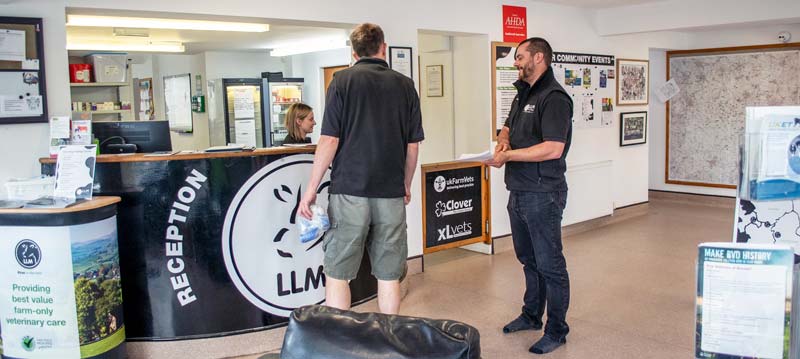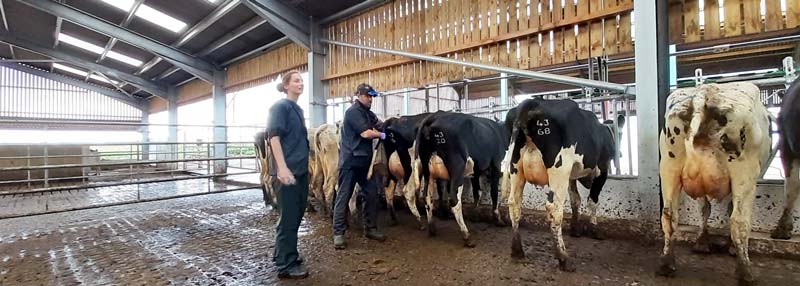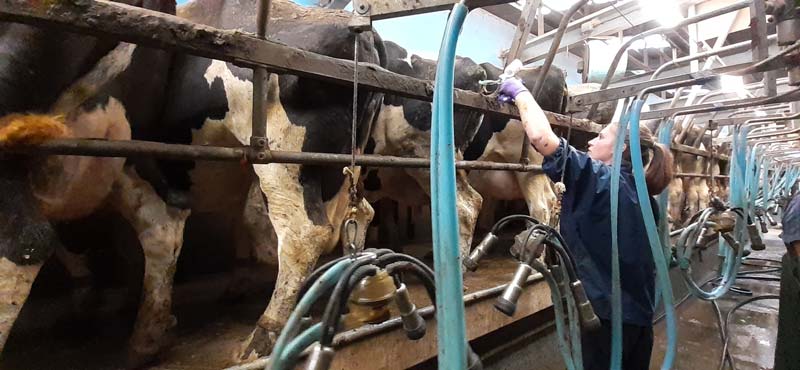21 Nov 2019
Earlier this year, Lambert, Leonard and May (LLM) Farm Vets became the latest farm practice to join the VetPartners group. VBJ paid a visit to see how this change has impacted on one of the UK’s most highly respected farm animal outfits...

Staff: full-time vets 33 • vet techs/TB techs 11 • embryo transfer techs/assistants 3 • practice administrators 30
LLM Farm Vets was born in 1999 when Den Leonard and Charlie Lambert decided to leave a local farm practice and open their own.
This officially became Lambert, Leonard and May when Den and Charlie were joined in their partnership by Bill May the following year. Based in a converted pub in Whitchurch, Shropshire, the practice has grown from those three early pioneers to a group that now employs more than 80 people – including 35 vets – across three main hub sites.
This impressive growth is reflected in the size of LLM’s client base, which now consists of more than 700 (mostly dairy) clients across the midlands, north Wales and Lancashire. And one thing’s clear – the secret of this practice’s success is its people; those it employs and those it serves, as vet and finance director Simon King explained.
He said: “The original partners came from a local farm practice and they wanted to do things differently.
“Traditionally, there had always been a focus for farm practices on selling medicines and that was the main income, but we wanted to increase the value of a vet’s clinical advice and for that to become the main focus.
“That meant putting people and relationships at the heart of that business, and while it has been a challenge, it has helped us get to where we are today as a practice.
“There are, of course, still challenges with this and we are not there yet with the rebalancing of fees; it has worked to a degree, but some farmers still like to buy boxes of things, rather than pay for your services.
“For example, the cost of us operating on a cow might be £100, which is way less than the cost of operating on a dog or cat. Our fee work is still cross subsidised from the medicine sales; that is what we have tried to get away from but it is a constant process.”

After years of consistent growth LLM moved out of independent hands earlier this year when the seven remaining partners decided the best way to keep the practice developing was to join VetPartners. This meant the partners sold their share in the business, which in turn allowed others within the organisation to progress their careers in ways not possible when the practice was still privately owned.
New managing director and practising vet Hannah Batty said: “Once the previous owners sold their shares, most of them did reinvest in the business, as VetPartners offers shares so that employees can have a say in how the day-to-day business is run.
“This also meant that instead of seven partners, we brought in a strategic board; the old structure has gone, in that if you owned shares you sat on the board, that is not the case now.
“We have two ex-owners and the rest of the board is vets and Hazel [Goodwin], who is the non-vet on there. There is a managing director, operations director, finance director, clinical services director, chair and one other clinical director. Additional clinical directors are invited at the board’s discretion to ensure the board is balanced in skill sets, experience and representation of the different locations.
“The new structure sees the three geographical sites working together in a much closer way. The strategic board represents the whole practice group, and has structures in place to ensure there is input from all of the sites. This ensures we can run efficiently as a larger group, but adapt to differences in the needs of our clients locally.
“VetPartners has given us a lot of autonomy in that regard and just let us get on with restructuring the practice in the way we thought best for the future. We are all employees of VetPartners now and some of us are shareholders since we joined them. The same applies to our clinical work – we have complete autonomy and clinical freedom with VetPartners.”

But it is not just those on the strategic board who have been given the chance to buy themselves a stake in the business. VetPartners has introduced an employee profit share and Employee Benefit Trust reward scheme to empower management teams in practices.
Hannah added: “Those shares will be offered to people by the management team of each particular practice to key individuals within that practice – people we want to keep and nourish within the business.
“And you don’t have to be on a certain level – it is about what that person brings to the business, not the level of seniority. It is hard to buy into practices as the market is making that unaffordable, so the way VetPartners is doing it is through this trust – the shares are cheap, but they have a lot of potential if we are successful and the business is profitable.
“It is good for someone at my stage of career because I could not afford to buy into most practices, but with these shares there is minimal risk and I still get that vested interest.”
Keeping team members at all levels of the business motivated and enfranchised is clearly important for the future of LLM. Running a successful veterinary practice – be it companion, mixed or farm – has always been a people business, but those dynamics are arguably even more important in farm work where clinical decisions can have such an impact on livelihoods.
Simon added: “VetPartners is doing this because some of the other corporates have not looked after their employees in this way, but in a service business like ours that is not going to work. Our people are our prize asses and we want to look after them.
“Farm is massively person to person; those relationships have such value that you must retain vets or you risk losing those relationships and that business forever.
“It used to be vets becoming owners and we have seen that change with the corporates in the market, so offering career progression and incentivising vets and non-vets to stay with the business for the long term is so important to us.
“It is also very community focused, so the skills, the knowledge and the people we have here are not interchangeable in the same way they might be in small animal practice.”

This focus on farmers and the community they live in has created a highly bonded client base and a revenue stream based increasingly on the veterinary services provided, rather than the medicines sold. And this is probably just as well, with the proliferation of internet pharmacies and some corporate buying power driving the margins made on medicines in only one direction.
Hannah said: “We need to offer a sustainable service; at the end of the day a dairy cow is still worth £1,000 to £2,000 and they will pay to make their animal better – the most valuable asset to our clients – so they need looking after. If we have got pricing pressures then the model may have to shift to looking at our fees.
“Part of it all is education and the clients building trust in you. We need to look at each individual business, spot the bottle necks and find ways to help that business run more efficiently and more productively – farmers will pay for that as they increase output and sell more milk.”
However, as Simon explained, the challenge is that each farm is different, with different people and different ways of managing the cows. He added: “It is up to us to tap into what drives that farm and help improve that.
“That is exciting as after a few years you are comfortable doing LDA [left displaced abomasum] surgeries, but actually it is great to be in a position to think, ‘how can I stop having to do these LDA surgeries?’.
“Then they start seeing you as a trusted advisor and then you can start charging for your advisory time, which is actually where we all want to be.
“And that is actually more sustainable as the farm client then wants you in, say, once a month, to review data and performance and plan based on this. We also run training courses on farms to help farm staff spot problems before they need us to.”
For the practice to remain sustainable it is also vitally important to attract and retain the right kind of new graduate vets – something that traditionally has not been a problem at LLM. With a highly organised intern scheme and plenty of support on offer, new vets are eased into the practice in a way that suits both the practice and its clients.
Hannah said: “We have just taken on two new graduates on our intern programme and we still do get a range of applicants. We are quite fortunate here with our client base as we are able to train the interns one to one and introduce them to our farm clients, and give the farmers time to build trust in those people. We also aim not to just give those new vets the rubbish jobs; we want to get them working on a farm where they can make a real difference. There will be a first and second vet in that scenario so they will be clinically supported in that particular environment, too.
“The appetite certainly seems to be there for farm work from what we see, but recruiting more experienced vets is an issue and that’s a challenge, so we do what we can to make sure we keep the young vets and develop them in a way that means they want to stay with the business.
“I am a good example, I started six years ago as an intern and I am still here, and I think our last three interns have all stayed with us, and that is because we give those interns the right kind of support. And the reason we brought that in was because we were struggling to recruit good vets, so we realised we would have to grow our own. That intern programme is a vital bloodline for us in that respect.”
While these young vets might not generate a lot of income for the business in the first few months, the thinking is 18 months down the line they will have a wealth of experience and have built the trust needed with the practice’s clients.
Hannah added: “Our clients are hardcore dairy clients with a lot of knowledge who have seen a lot of vets down the years, they know what they are doing and they know what they are seeing so supporting those young vets is vital to give them the right grounding.
“That way the farmers get to know the interns and a lot of them like the idea of helping train up the interns on their farms.”
While a significant part of the practice’s revenue does come from tuberculin testing, this work is not always popular with general farm vets so is carried out by a TB-specific team.

Other elements are also built into the working fabric of LLM designed to ensure its team does not begin to buckle under some of the pressures that can come with this kind of work, as operations director Hazel Goodwin explained.
She said: “It is quite a fun place to work, too, and that matters; our values are positivity, innovation, empathy, efficiency and effectiveness. But right at the top of that list is the desire that this practice is fun, friendly, happy and professional.
“At Whitchurch, we have a 1-in-12 rota and that helps with work-life balance, while we also have a buy and sell scheme so people can sell a night to someone and lose some money for doing that, other people can pick that up – we do the same with weekend work, too.
“On bank holidays vets are able to put their names down on the rota and receive extra payment, if they want to work any part of it.”
LLM also makes much use of its team of vet techs; trained, non-veterinary staff as part of a vet-led team who work with farmers with administering vaccines, disbudding calves and helping with mobility scoring.
Hazel added: “These vet techs can help deliver better results; for example, with vaccinations, you know that it is going to have a good cold chain from our premises into the animal and that no animals will get missed. The farmer gets better penetration and compliance, and a better response in that population.
“The supermarkets are driving more mobility scoring and condition scoring, so there is more and more auditing, so having an independent vet tech who is properly trained is a huge help for these farmers.
“Also, as price pressures come on, these vet techs will be cheaper than vets, so if they go on farm and do this kind of work it frees up vet time to focus on more clinical and advisory work.”
LLM and VetPartners are also helping develop a new vet tech qualification and in time – under the paraprofessional umbrella – have them registered with the RCVS.
In addition to the core clinical veterinary work, the practice successfully set up a bovine embryo transfer business in 2005.
Hazel added: “We always try to encourage new ideas that team members have, and a great example of this is the UKET service, introduced and set up when Mike Christie joined the practice in 2005.
He saw an opportunity for a veterinary back embryo transfer service and we haven’t looked back since. It’s vital that everyone in the team feels they can contribute their ideas – after all, that is how many great projects and initiatives start out.”

So, it appears the practice is in good hands and well set for what could be challenging times ahead. Milk prices remain an issue in what is a business to business environment, while the new tender process for bTB is due to begin again next year.
There is also increasing competition for fewer and fewer farm clients, which leaves everyone in the sector fighting for a smaller share.
But despite these challenges, the future looks bright for LLM. Simon said: “There are always new challenges, but that is just part of life in this sector. We need to get better and better at buying to support our margins and look for new work as well – being part of VetPartners can only help that and hopefully we can get more national work.
“Every day is something different and there is real excitement. But the best thing is coming in here and seeing a bunch of mates, and then going out to farms and seeing another bunch of mates. There is just a bit of everything and I love it all.
“I Iove the variety – it has always been a fun and positive place to work – and being part of the community and being part of that way of life.”